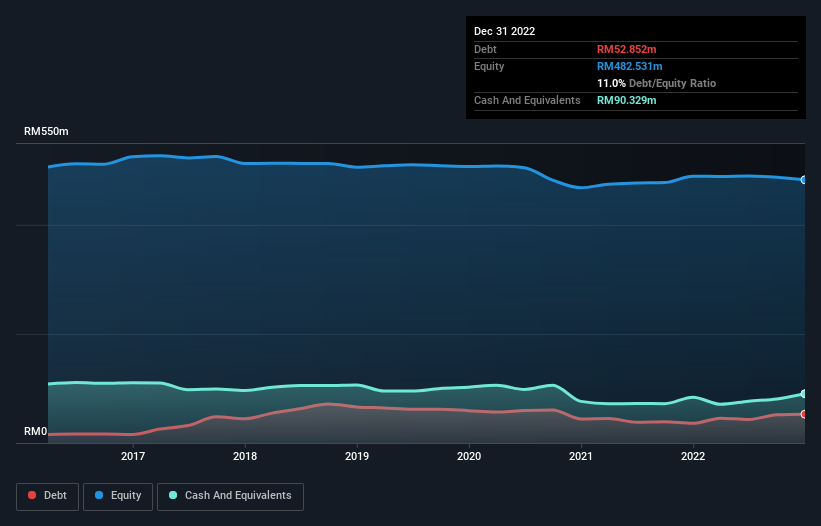Is GUH Holdings Berhad (KLSE:GUH) Weighed On By Its Debt Load?
David Iben put it well when he said, 'Volatility is not a risk we care about. What we care about is avoiding the permanent loss of capital.' So it might be obvious that you need to consider debt, when you think about how risky any given stock is, because too much debt can sink a company. Importantly, GUH Holdings Berhad (KLSE:GUH) does carry debt. But is this debt a concern to shareholders?
When Is Debt Dangerous?
Debt is a tool to help businesses grow, but if a business is incapable of paying off its lenders, then it exists at their mercy. If things get really bad, the lenders can take control of the business. However, a more common (but still painful) scenario is that it has to raise new equity capital at a low price, thus permanently diluting shareholders. Having said that, the most common situation is where a company manages its debt reasonably well - and to its own advantage. When we think about a company's use of debt, we first look at cash and debt together.
See our latest analysis for GUH Holdings Berhad
What Is GUH Holdings Berhad's Net Debt?
You can click the graphic below for the historical numbers, but it shows that as of December 2022 GUH Holdings Berhad had RM52.9m of debt, an increase on RM36.1m, over one year. But on the other hand it also has RM90.3m in cash, leading to a RM37.5m net cash position.

A Look At GUH Holdings Berhad's Liabilities
The latest balance sheet data shows that GUH Holdings Berhad had liabilities of RM83.6m due within a year, and liabilities of RM44.8m falling due after that. On the other hand, it had cash of RM90.3m and RM46.6m worth of receivables due within a year. So it can boast RM8.59m more liquid assets than total liabilities.
This surplus suggests that GUH Holdings Berhad has a conservative balance sheet, and could probably eliminate its debt without much difficulty. Succinctly put, GUH Holdings Berhad boasts net cash, so it's fair to say it does not have a heavy debt load! There's no doubt that we learn most about debt from the balance sheet. But you can't view debt in total isolation; since GUH Holdings Berhad will need earnings to service that debt. So when considering debt, it's definitely worth looking at the earnings trend. Click here for an interactive snapshot.
In the last year GUH Holdings Berhad's revenue was pretty flat, and it made a negative EBIT. While that's not too bad, we'd prefer see growth.
So How Risky Is GUH Holdings Berhad?
Although GUH Holdings Berhad had an earnings before interest and tax (EBIT) loss over the last twelve months, it generated positive free cash flow of RM4.6m. So taking that on face value, and considering the net cash situation, we don't think that the stock is too risky in the near term. We'll feel more comfortable with the stock once EBIT is positive, given the lacklustre revenue growth. When analysing debt levels, the balance sheet is the obvious place to start. But ultimately, every company can contain risks that exist outside of the balance sheet. For instance, we've identified 1 warning sign for GUH Holdings Berhad that you should be aware of.
When all is said and done, sometimes its easier to focus on companies that don't even need debt. Readers can access a list of growth stocks with zero net debt 100% free, right now.
New: Manage All Your Stock Portfolios in One Place
We've created the ultimate portfolio companion for stock investors, and it's free.
• Connect an unlimited number of Portfolios and see your total in one currency
• Be alerted to new Warning Signs or Risks via email or mobile
• Track the Fair Value of your stocks
Have feedback on this article? Concerned about the content? Get in touch with us directly. Alternatively, email editorial-team (at) simplywallst.com.
This article by Simply Wall St is general in nature. We provide commentary based on historical data and analyst forecasts only using an unbiased methodology and our articles are not intended to be financial advice. It does not constitute a recommendation to buy or sell any stock, and does not take account of your objectives, or your financial situation. We aim to bring you long-term focused analysis driven by fundamental data. Note that our analysis may not factor in the latest price-sensitive company announcements or qualitative material. Simply Wall St has no position in any stocks mentioned.
About KLSE:GUH
GUH Holdings Berhad
An investment holding company, engages in the electronic, property development, and utilities businesses in Malaysia, China, Indonesia, Singapore, and internationally.
Excellent balance sheet and slightly overvalued.
Market Insights
Weekly Picks


Crazy Undervalued 42 Baggers Silver Play (Active & Running Mine)


Fiducian: Compliance Clouds or Value Opportunity?

Willamette Valley Vineyards (WVVI): Not-So-Great Value
Recently Updated Narratives

Watch Pulse Seismic Outperform with 13.6% Revenue Growth in the Coming Years

Significantly undervalued gold explorer in Timmins, finally getting traction

Moderation and Stabilisation: HOLD: Fair Price based on a 4-year Cycle is $12.08
Popular Narratives


MicroVision will explode future revenue by 380.37% with a vision towards success


NVDA: Expanding AI Demand Will Drive Major Data Center Investments Through 2026





